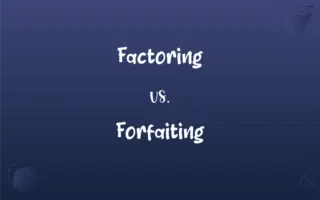Fact vs. Theory: What's the Difference?
Edited by Janet White || By Harlon Moss || Published on February 8, 2024
Fact refers to an objective, verifiable observation. Theory refers to a well-substantiated explanation of some aspect of the natural world.

Key Differences
A fact is a statement that can be proven true or false through objective evidence, while a theory is a coherent set of principles that explains observed phenomena and is supported by evidence.
Facts are data points or observations about the world, often empirical in nature, whereas theories are frameworks for understanding and explaining these facts in a broader context.
Facts are specific and unchanging in the light of new evidence, while theories are dynamic and can be modified or replaced as new facts and understanding emerge.
Theories are often an assembly of interconnected facts that are used to explain larger concepts, whereas facts stand alone as singular truths.
In the scientific process, theories are developed to explain facts, and new facts can lead to the refinement or reassessment of existing theories.
ADVERTISEMENT
Comparison Chart
Nature
Concrete and observable
Abstract and explanatory
Dependence on Evidence
Independent of belief
Dependent on a body of evidence
Flexibility
Inflexible, remains constant
Flexible, evolves with new evidence
Role in Science
Basis for further inquiry
Framework for understanding
Example
The Earth orbits the Sun
Theory of Gravity explains why
ADVERTISEMENT
Fact and Theory Definitions
Fact
A fact is an objective reality.
The Eiffel Tower is in Paris.
Theory
A theory is a set of principles on which the practice of an activity is based.
Newton's theory of motion predicts the movement of objects.
Fact
A fact is something known to exist or to have happened.
Neil Armstrong walked on the moon in 1969.
Theory
A theory is an idea used to account for a situation or justify a course of action.
Game theory provides strategies for decision-making in economics.
Fact
A fact is an observation confirmed through empirical evidence.
The sun rises in the east.
Theory
A theory is a system of ideas intended to explain something.
The Big Bang theory explains the origin of the universe.
Fact
A fact is a statement that is true and can be proven.
Water boils at 100°C.
Theory
A theory is a proposed explanation for a phenomenon.
The theory of evolution by natural selection explains species diversity.
Fact
A fact is a piece of information presented as having objective reality.
Diamonds are the hardest natural substance.
Theory
A theory is a hypothesis that has been substantiated by significant evidence.
Germ theory explains many diseases.
Fact
Knowledge or information based on real occurrences
An account based on fact.
A blur of fact and fancy.
Theory
A set of statements or principles devised to explain a group of facts or phenomena, especially one that has been repeatedly tested or is widely accepted and can be used to make predictions about natural phenomena.
FAQs
How do we determine if something is a fact?
Through observation, measurement, and empirical evidence.
Can a fact change over time?
Yes, what is considered a fact can change as new information or evidence becomes available.
Is a fact always true?
A fact is considered true based on current evidence, but it may be re-evaluated with new findings.
Is a scientific fact absolute?
Scientific facts are the best current explanations based on evidence, but they are open to revision or rejection with new evidence.
Are facts the same as truths?
Facts are statements that can be proven true or false; truths are broader and can include personal beliefs.
How do facts differ from theories?
Facts are specific pieces of information, while theories are explanations of how and why facts are related.
How is a theory developed?
Through the scientific method, involving hypothesis formation, experimentation, observation, and refinement.
Can a fact be disproven?
Yes, if new evidence or information contradicts the current understanding.
What is a fact?
A fact is a statement that can be proven to be true or false based on evidence or reality.
Can a fact be an opinion?
No, a fact is based on objective evidence, not personal feelings or opinions.
Are theories facts?
Theories are explanations of facts; they are not facts themselves.
How do theories contribute to science?
They provide frameworks for understanding observations and predicting future events.
What is a theory?
A theory is a well-substantiated explanation of some aspect of the natural world that is based on a body of evidence.
Do all theories eventually become facts?
No, theories explain facts; they do not transform into facts.
Are historical facts always accurate?
Historical facts are based on the best available evidence and interpretations but can be subject to revision.
Is a theory the same as a hypothesis?
No, a hypothesis is a tentative explanation, while a theory is a well-supported and widely accepted explanation.
Can a theory be proven?
Theories can't be proven absolutely but can be strongly supported by evidence.
Is a theory always scientific?
In common usage, theory can refer to a guess, but in science, a theory is a well-supported explanation.
What makes a good scientific theory?
A good theory is falsifiable, consistent with existing evidence, and able to make accurate predictions.
Can theories change?
Yes, theories can evolve or be replaced as new evidence becomes available.
About Author
Written by
Harlon MossHarlon is a seasoned quality moderator and accomplished content writer for Difference Wiki. An alumnus of the prestigious University of California, he earned his degree in Computer Science. Leveraging his academic background, Harlon brings a meticulous and informed perspective to his work, ensuring content accuracy and excellence.
Edited by
Janet WhiteJanet White has been an esteemed writer and blogger for Difference Wiki. Holding a Master's degree in Science and Medical Journalism from the prestigious Boston University, she has consistently demonstrated her expertise and passion for her field. When she's not immersed in her work, Janet relishes her time exercising, delving into a good book, and cherishing moments with friends and family.







































































